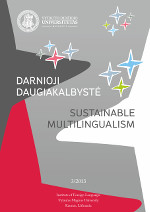Tekstai ir tekstynai svetimos kalbos mokymosi procese
Texts and Corpora in the Process of Second Language Acquisition
Author(s): Vytenis KončiusSubject(s): Foreign languages learning
Published by: Vytauto Didžiojo Universitetas
Keywords: language acquisition; language learning; corpus analysis; lexical minimum; lexical item; “narrow reading”; “broad reading”
Summary/Abstract: Corpus linguistics can help in the process of second language acquisition, for example, by examining a number of well-established claims or “myths” about second language teaching and learning. One of these claims, which is rarely examined, is the supposed benefit of extensive reading to the successful acquisition of the vocabulary (Krashen et al). This claim states that a language learner can accumulate sufficient lexical knowledge of a second language only by exposing oneself to sufficient input by extensive reading. Corpus analysis can help answer the vital questions which often arise to language teachers and learners, such as the following: is extensive reading really adequate and sufficient to accumulate the most important lexical items of a second language? What impact will reading of various types of texts have? Is it better to read texts written by the same or by various authors (i.e., “broad” or “narrow” reading)? The study of two relatively large corpora (1 100 000 words each) attempted to compare how the reading of texts can help learners master the English language vocabulary and how many gaps would be left in their vocabulary knowledge. The study found that in order to successfully acquire the adequate range of English vocabulary, the learner must receive enormous amounts of input, which is often not very feasible. Thus, neither the “broad” nor “narrow” reading are found to be adequate for the sufficiently frequent encounter with all most important English lexical items necessary for a learner to successfully function in an English language environment (so-called “lexical minimum”). After analysing the study results, further suggestions and research guidelines are discussed.
Journal: Darnioji daugiakalbystė
- Issue Year: 2013
- Issue No: 3
- Page Range: 77-95
- Page Count: 19
- Language: Lithuanian

